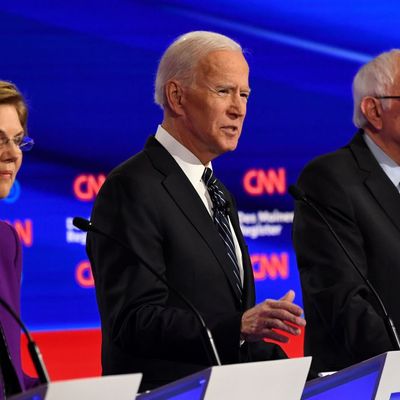
In retrospect, it was probably predictable that a CNN moderator would lob the hand grenade of a sharp factual disagreement between old friends and allies Bernie Sanders and Elizabeth Warren, bringing powerful emotional undertones onto the debate stage in Des Moines on Tuesday night. After all, it was CNN that broke the story just yesterday, which alleged that Sanders had told Warren in 2018, when they were discussing their respective presidential ambitions, that a woman just couldn’t beat Trump. Sanders heatedly denied the report outright, Warren more or less validated it completely. We’ll never know if either candidate would have brought it up had Abby Phillip not forced the issue. But she did, leading to a number of tense moments between Sanders and Warren, even though they were ostensibly agreeing that a woman could and should win the presidency.
The tension spilled over into an oddly heated moment when Sanders disputed Warren’s contention that she was the only candidate to beat a Republican incumbent in the last 30 years. He objected that he had done so in 1990 — exactly 30 years ago, as Warren pointed out with an exasperated shake of her head.
And while the two progressive candidates suspended hostilities for the remainder of the debate, immediately afterward they had what looked like an unhappy exchange, and conspicuously did not shake hands.
The thing to remember is that it could have been far worse: Phillips could have directly asked both candidates if they thought the other was lying about the conversation they both agreed they had in 2018. Instead she listened without comment to Sanders’s denial, and then turned to Warren and stipulated he had made it as reported and asked how she felt about it (“I disagreed,” said Warren tersely).
But the question now is whether it’s going to get far worse in the days just ahead, as the Washington Post’s Matt Viser points out:
This dispute, if it continues, could overshadow the run-up to the caucuses just as it overshadowed the Des Moines debate. The impact, of course, depends on how the two candidates and their surrogates comport themselves, and whether there is any independent reporting casting further light on who said what when, and who (if anyone in particular) dragged this into the campaign. The potential for warfare between the two candidates’ camps goes beyond the factual disputes involved: Team Bernie may see this as a deliberate breach of the peace by Team Warren that justifies swift and brutal retaliation, and Team Warren most definitely thinks the underlying issue of the electability of women has been a millstone for their candidate, whether or not Sanders or his supporters are behind the persistent fear-mongering among Democrats on this subject.
If open warfare does break out on the highways and byways of Iowa or on the mean streets of Twitter, it’s hard to imagine either candidate “winning” this exchange. Iowans famously don’t like negative campaigning, and if the Sanders and Warren campaigns go after each other, they could suffer the fate of 2004 Democrats Dick Gephardt and Howard Dean, who battled for the polling lead in the caucuses and finished third and fourth after a “murder-suicide” series of alternating negative ads. In that scenario, the only winners would be one or more of the progressives’ ideological foes: Biden, Buttigieg, or Klobuchar (indeed, a meltdown involving either or both Sanders and Warren may be Klobuchar’s last chance of a breakthrough finish in Iowa).
For all the raw passions involved, the Sanders and Warren camps understand this, and could achieve a quick (if forced) detente, at least through Iowa. But it wouldn’t take much in the way of rogue emails or tweets from one side or the other to reignite the fight. And it’s not like tensions didn’t already exist: Just before the CNN report on the 2018 meeting broke, reports that the Sanders campaign was sending around talking points for volunteers describing Warren as the candidate of “elites” led her to say she was “disappointed to hear that Bernie is sending his volunteers out to trash me.”
Whatever is going to happen between the two campaigns, for better or ill, could and should happen fast. The rest of the field, along with Democrats hoping for a calm and rational nominating contest characterized by what has been reasonably civil conduct, may feel like events are slipping out of their control. That already seems to be happening with respect to the careful plans of four other candidates as executed in the Des Moines debate, which may only be remembered for this sudden blowup.






























